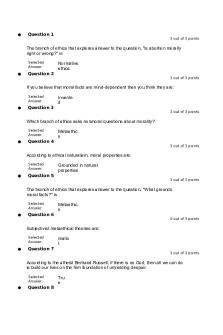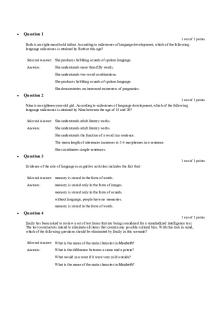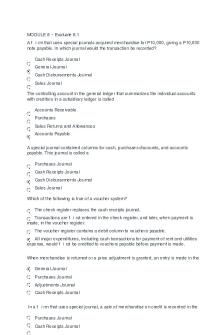Quiz 8 - Quiz 8 PDF

| Title | Quiz 8 - Quiz 8 |
|---|---|
| Course | Philosophy and Contemporary Ideas |
| Institution | Liberty University |
| Pages | 4 |
| File Size | 57.8 KB |
| File Type | |
| Total Downloads | 69 |
| Total Views | 190 |
Summary
Quiz 8...
Description
●
Question 1 3 out of 3 points
The branch of ethics that explores answer to the question, "Is abortion morally right or wrong?" is Selected Answer:
●
Normative ethics
Question 2 3 out of 3 points
If you believe that moral facts are mind-dependent then you think they are: Selected Answer:
●
Invente d
Question 3 3 out of 3 points
Which branch of ethics asks nonmoral questions about morality? Selected Answer:
●
Metaethic s
Question 4 3 out of 3 points
According to ethical naturalism, moral properties are: Selected Answer:
●
Grounded in natural properties
Question 5 3 out of 3 points
The branch of ethics that explores answer to the question, "What grounds moral facts?" is Selected Answer:
●
Metaethic s
Question 6 0 out of 3 points
Subjectivist metaethical theories are: Selected Answer:
●
realis t
Question 7 3 out of 3 points
According to the atheist Bertrand Russell, if there is no God, then all we can do is build our lives on the firm foundation of unyielding despair. Selected Answer:
●
Question 8
Tru e
3 out of 3 points
One advantage of Theism over Platonic Atheism, is that: Selected Answer:
●
Theism ultimately grounds moral facts in a person, whereas they are brute facts for Platonic Atheism. Question 9 3 out of 3 points
Just because an individual (or group of individuals) believe something is the case, that doesn't mean it is the case. Selected Answer:
●
Tr ue
Question 10 3 out of 3 points
Examples of noncogitivist metaethical theories include: Selected Answer:
●
Prescriptivis m
Question 11 3 out of 3 points
According to emotivism, "murder is wrong" is understood to mean: Selected Answer:
●
"I disapprove of murder"
Question 12 3 out of 3 points
According to simple subjectivism, whatever an individual believes to be true is true (for that person). Selected Answer:
●
Tr ue
Question 13 Needs Grading
Which metaethical theory holds that morality is subjective and grounded in attitudes? Selected Answer:
The Meta-ethical theory that holds as subjective and grounded in attitued is the theory of Meta-ethical Relativism. Response Feedback:
●
[None Given]
Question 14 0 out of 3 points
Which distinction is made among Divine Command Theorists?
Selected
Metaphysical/mate
Answer:
●
rial
Question 15 0 out of 3 points
Egoism necessarily entails the ideas that one should not help his neighbor and that one should do whatever he/she wants to do.
Selected Answer:
●
Tr ue
Question 16 3 out of 3 points
Normative Ethics is the branch of ethics that:
Selected Answer:
●
deals with questions regarding the “how” of morality; is concerned most centrally with questions about the way of doing morality.
Question 17 0 out of 3 points
For MacIntyre, the process of judging the intellectual viability of ethical views is a 3stage process. Which is NOT one of those stages?
Selected Answer:
●
A stage in which the relevant beliefs, texts, and authorities have not been put in question
Question 18 3 out of 3 points
The authors use the quote by Ayn Rand, man “must live for his own sake, neither sacrificing himself to other nor sacrificing other to himself” to describe which ethical theory?
Selected Answer:
●
Egois m
Question 19 0 out of 3 points
The authors note that because Utilitarianism broadens its concern to all people or an entire community, it is an improvement on Egoism.
Selected Answer:
●
Fal se
Question 20 3 out of 3 points
Deontological theories are primarily concerned with:
Selected Answer:
●
Duties, obligations, and moral commands
Question 21 0 out of 3 points
The authors describe the ancient concept eudaimonia (what Aristotle believed to be
the end/purpose of every man) as:
Selected Answer:
●
Happine ss
Question 22 3 out of 3 points
A virtue is some positive characteristic of a person that is life- producing, beneficial, or helpful in nature.
Selected Answer:
●
Tr ue
Question 23 3 out of 3 points
In Deontological ethics, “a rule or command that is universally and objectively applicable” is called a:
Selected Answer:
●
Categorical imperative
Question 24 3 out of 3 points
Which of the following are objections to/weakness of utilitarianism provided by the authors?
Selected Answer:
●
All of the above
Question 25 0 out of 3 points
Aristotle believed that we can find virtue between the vices of excess and deficiency. This virtuous point in between the vices he called:
Selected Answer:
Temperan ce...
Similar Free PDFs

Quiz 8 - Quiz 8
- 4 Pages

Quiz 8 - Weekly Quiz
- 6 Pages

Quiz Chapter 8 - Quiz
- 6 Pages

Quiz-8 - QUIZ
- 22 Pages

Buslaw QUIZ 8 - Quiz
- 6 Pages

Chapter 8 quiz #8
- 3 Pages

Quiz 8 - Chapter 8 Quiz Solved.
- 2 Pages

Chapter 8 Quiz - Weekly Quiz
- 3 Pages

Acctg quiz 8 - Accounting quiz
- 2 Pages

Week 8 quiz - Week 8
- 19 Pages

CS1101 Unit 8 Quiz
- 8 Pages

Renal (8) Quiz
- 7 Pages

Quiz 8 ve4rsion 11
- 15 Pages

Chapter 8 Quiz Review
- 6 Pages

Chapter 8 mulitple - quiz
- 6 Pages
Popular Institutions
- Tinajero National High School - Annex
- Politeknik Caltex Riau
- Yokohama City University
- SGT University
- University of Al-Qadisiyah
- Divine Word College of Vigan
- Techniek College Rotterdam
- Universidade de Santiago
- Universiti Teknologi MARA Cawangan Johor Kampus Pasir Gudang
- Poltekkes Kemenkes Yogyakarta
- Baguio City National High School
- Colegio san marcos
- preparatoria uno
- Centro de Bachillerato Tecnológico Industrial y de Servicios No. 107
- Dalian Maritime University
- Quang Trung Secondary School
- Colegio Tecnológico en Informática
- Corporación Regional de Educación Superior
- Grupo CEDVA
- Dar Al Uloom University
- Centro de Estudios Preuniversitarios de la Universidad Nacional de Ingeniería
- 上智大学
- Aakash International School, Nuna Majara
- San Felipe Neri Catholic School
- Kang Chiao International School - New Taipei City
- Misamis Occidental National High School
- Institución Educativa Escuela Normal Juan Ladrilleros
- Kolehiyo ng Pantukan
- Batanes State College
- Instituto Continental
- Sekolah Menengah Kejuruan Kesehatan Kaltara (Tarakan)
- Colegio de La Inmaculada Concepcion - Cebu
